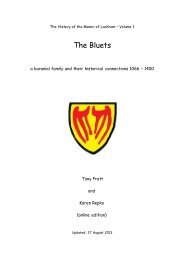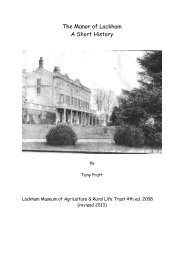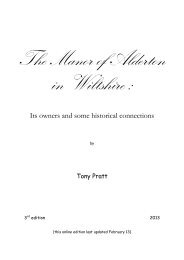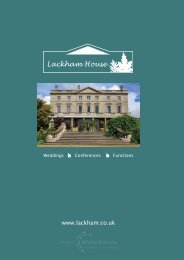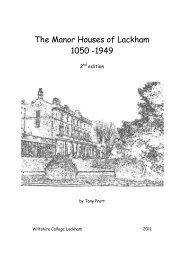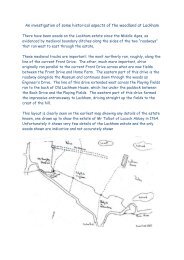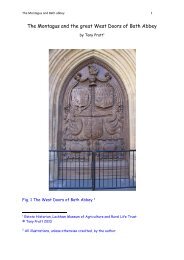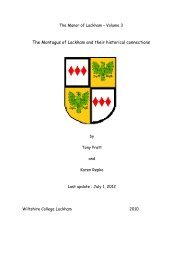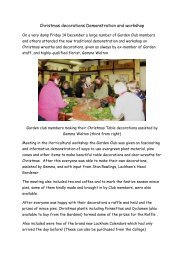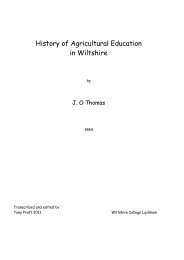The Baynard family - Lackham Countryside Centre
The Baynard family - Lackham Countryside Centre
The Baynard family - Lackham Countryside Centre
Create successful ePaper yourself
Turn your PDF publications into a flip-book with our unique Google optimized e-Paper software.
<strong>The</strong> <strong>Baynard</strong>s of <strong>Lackham</strong><br />
probably indicates that no marriage had taken place at this time<br />
either. It is possible that James and Joan were married elsewhere<br />
and moved out of the area - there is no record of Joan’s burial at<br />
Lacock or for her daughter Anne, either.<br />
James did exist, however; there is an Administration Bond 329<br />
naming him which is dated 1638, when he was 27 330 . From this it is<br />
possible to conclude that James died relatively young, didn’t leave a<br />
will and that the inheritance concerned was not small. This doesn’t<br />
give a great deal of information but it does mean that James died in<br />
1638, which raises a problem; the Lacock burials register does not<br />
show a James <strong>Baynard</strong> being buried in 1638, or indeed at any time<br />
between 1630 and 1645. <strong>The</strong>re is, however, a William <strong>Baynard</strong> who<br />
was apparently buried at Lacock 22 nd June 1638. This was, however,<br />
4 months after the date of the Administration Bond, which is<br />
another puzzle. Possibly this is a different (and another unknown)<br />
<strong>Baynard</strong>…..”<br />
329 extract from an article by Mary Williams of the Bristol Record Office, at<br />
http://www.bafhs.org.uk/research-room/projects/126-administrations<br />
When a person died without leaving a Will, his next-of-kin, a close friend, or<br />
a creditor (someone to whom the dead person owed money), might apply to the<br />
Probate Court for the legal right to administer the estate. (In the majority of<br />
cases, where the estate was small and there was no doubt as to who should<br />
inherit, no application was made, and therefore no record survives.).<br />
<strong>The</strong> process of Administration gave rise, in general, to three types of<br />
documentation, namely Letters of Administration, Administration Act Registers,<br />
and Administration Bonds.<br />
Letters of Administration were granted to the applicant who had to swear that<br />
there was no will, that he would pay funeral expenses and all debts, that he<br />
would administer truly and submit a true inventory and account of his<br />
stewardship…. When the Court granted the Letters, details of the<br />
Administration would be entered into a Register. <strong>The</strong> Court might require the<br />
Administrator to enter into a Bond to administer the estate faithfully. <strong>The</strong>se<br />
were, until 1733, written in Latin<br />
330 W&SHC P3/B/398<br />
Administration bond for John Power? For the “goods and chattels of James<br />
<strong>Baynard</strong> late of <strong>Lackham</strong> in the parish of Lacock in the county of Wilts“ dated<br />
27 Feb 1638<br />
101



